Irvine Weekly’s Movie Guide is your look at the hottest films available on your TV sets, electronic devices and in select drive-ins and theaters throughout Southern California. Theaters remain closed, but the good news is that there’s no shortage of diverse and engaging films to see at home. And as always, we let you know what’s worth the watchtime and what’s not — from indie art house gems to popcorn-perfect blockbusters to new movies garnering buzz — indicating where you can catch them whether it be digital Video on Demand (VOD) or streaming subscription services.
The Tax Collector (VOD)
The Tax Collector, the new South L.A. action movie from writer-director David Ayers, featuring Shia LaBeouf in a flashy supporting role (he’s definitely not the star, despite the press coverage), is, to use a technical term they taught me in film critic’s school, bad. In South L.A., David (Bobby Soto) kisses his wife and kids, says a prayer, and then heads out for a day collecting the money owed to his uncle (George Lopez), the much-feared kingpin of a vast Mexican drug gang. At his side is Creeper (LaBeouf), his white boy best friend and enforcer, who wears 3-piece suits, extols the virtues of mediation and exults in torturing those who fail to pay up. A drug war against a vicious interloper from Mexico (Jose Conejo Martin) sets off a chain of violence directed at those David loves, but the action sequences, while memorably mean, are so poorly staged and crudely edited that it’s hard to tell what’s going on, much less care. You would not know from this movie that Ayers (Suicide Squad, Fury) is a seasoned pro. While Ayers deserves credit for writing a movie for an all Latino cast, and for filming locally, his script is a painful throwback to the sad days of Hollywood Latino clichés. The bad guy actually performs a bloody Santeria sacrifice before the big showdown, complete with a happy-to-be-sacrificed naked lady. In the cinematic mind of David Ayers, the Seventies and Eighties are alive and well.
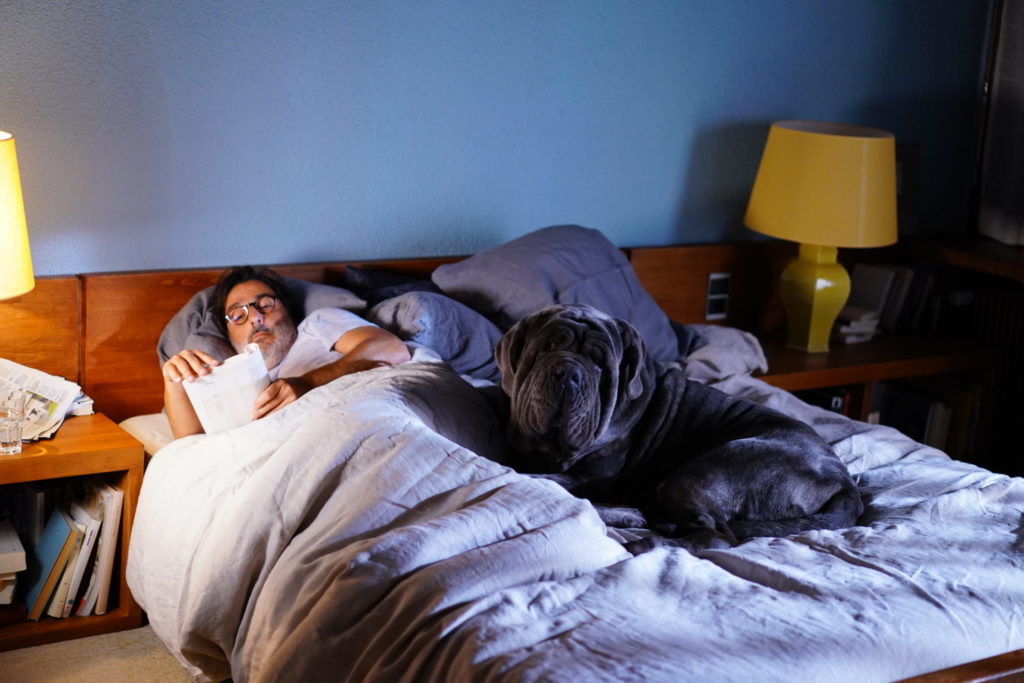
MY DOG STUPID (David Koskas)
My Dog Stupid (Laemmle Virtual Cinema)
“When is the last time we laughed?” a husband asks his wife and though she has no answer, a bit later the couple find themselves laughing uproariously at a sudden, ridiculous turn in the life of one of their adult children.That’s how it goes in a long marriage, and in My Dog Stupid (Mon chien Stupide), the marvelous new film from French actor-filmmaker Yvan Attal, adapting a novella by L.A. writer John Fante (Ask the Dust). Attal plays Henri, a novelist whose greatest success is long behind him, a fact he blames on the demands of his wife, Cécile (Charlotte Gainsbourg, Attal’s life partner), and their four children, all grown, but still living at home.One rainy night, a huge, rude dog, a Neapolitan Mastiff, origins unknown, enters the house uninvited and wins Henri’s bitter heart, while annoying Cécile profoundly. Nothing really happens with this dog — this isn’t a cute mutt movie — but Stupide, as Henri dubs him, loosens the family stasis, prompting all manner of change, including the gradual departure of the kids.Their absence leaves Henri and Cécile alone and gives Attal and Gainsbourg the space to dive deep into the mysteries of a long relationship, a subject they’ve explored in two previous films. Henri and Cécile don’t work anymore but they can’t quite say why. Time has pulled and tugged at them, but as with a great dog, even a stupid one, sometimes you have trust that even when they race up ahead, they eventually pause and wait for you to catch up.
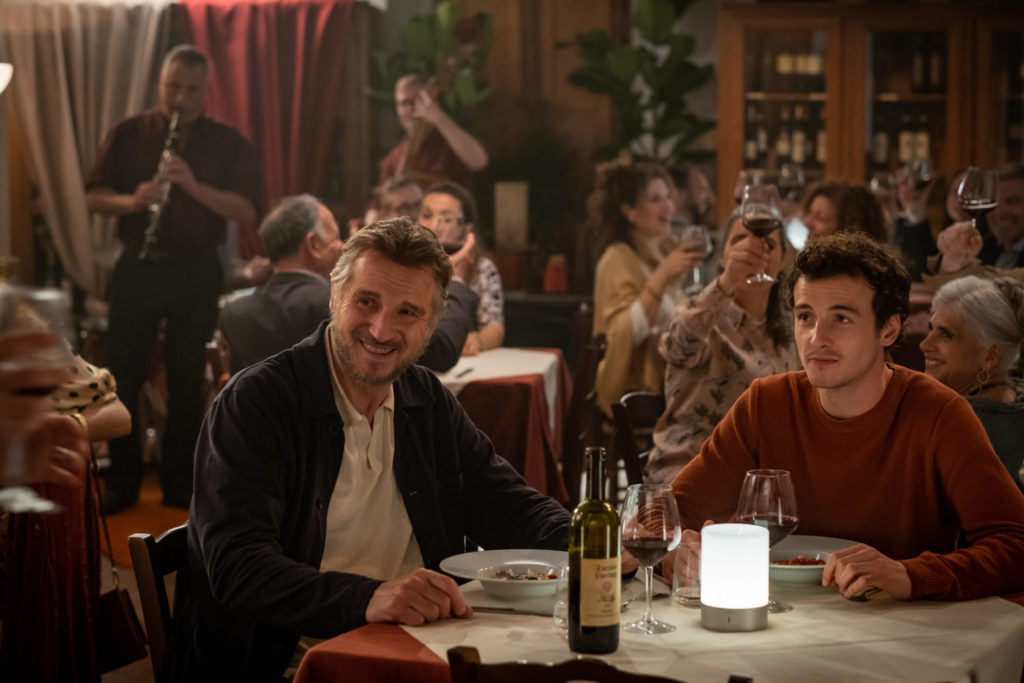
MADE IN ITALY (IFC Films)
Made In Italy (VOD)
There’s nary an original moment to be found beneath the lovely Tuscan skies of Made in Italy, a dramatically anemic father-son drama starring Liam Neeson and his 25-year-old son, Micheál Richardson. It seems safe to say that the two are drawing on their shared grief over the sudden death, 11 years ago, of Neeson’s wife, actress Natasha Richardson.In need of cash, Jack (Richardson) has persuaded his painter father, Robert (Neeson), to travel with him to Tuscany to sell the family home they haven’t lived in since the death of Jack’s mother when he was a boy. Father and son have resentments to resolve, and in the village, there’s a beautiful chef (Valeria Bilello) for Jack to woo but the film story is otherwise thin.For his feature debut, English actor turned filmmaker James D’Arcy has written a movie that’s perfectly pleasant but slow to get going and then labored at the end. The editing, especially in the film’s final third, is often choppy, giving one the sense of a director who didn’t have all the footage he needed when he got to the editing room.Still, there are nice moments, and flashes of the richer drama that could have been. Young Richardson is undeniably handsome and so emotionally open that it’s hard not to think of his amazing mother, who would surely be bursting with pride just now.
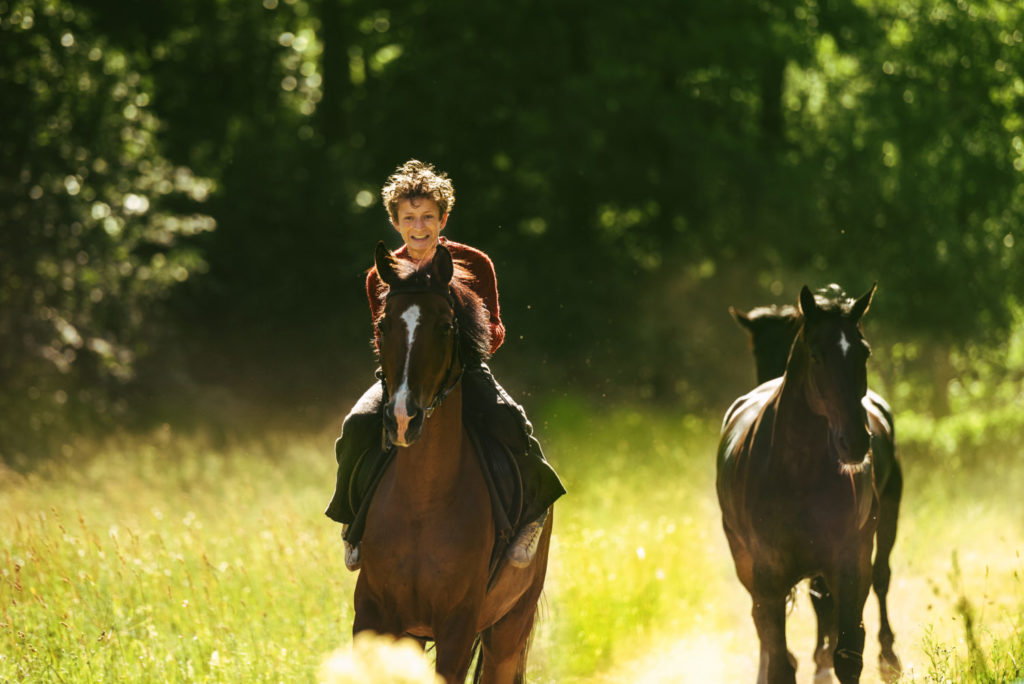
OUT STEALING HORSES (Magnolia Pictures)
Out Stealing Horses (VOD)
Actually, Trond (Jon Ranes) and his friend Jon (Sjur Vatne Brean) aren’t stealing horses; they’re stealing rides, on wild horses running free in the woods near their Norway farms. It’s 1948 and on the day Trond, at age 67 (now played by Stellan Skarsgard), is looking back on, something terrible happened to Jon, the first of many tragedies that haunt this visually exquisite Swedish epic.Adapted by writer-director Hans Petter Moland from Per Petterson’s acclaimed novel, Out Stealing Horses moves elegantly back and forth in time, as Trond, is forced by the unexpected appearance of Jon’s brother to reconsider his life.The film is most effective in the 1948 scenes, as young Trond, powerfully played by Ranes, struggles to reconcile his adoration for his father (Tobias Santelmann) with the secrets he’s discovering about him, including an affair with Jon’s mother, on whom Trond has a crush.There are many more secrets, accidents and losses to come — it all gets a bit exhausting — but Out Stealing Horses is deeply moving when it depicts Trond and his father moving through their everyday world, and its magnificent Norwegian landscapes. Sequences of Trond and his father felling trees and then attempting to send them down river to Sweden are more gripping than any recent action film.I’ll admit to having lost the thread on Trond’s soul dilemma by the end but this is nonetheless an engrossing, impressive film.
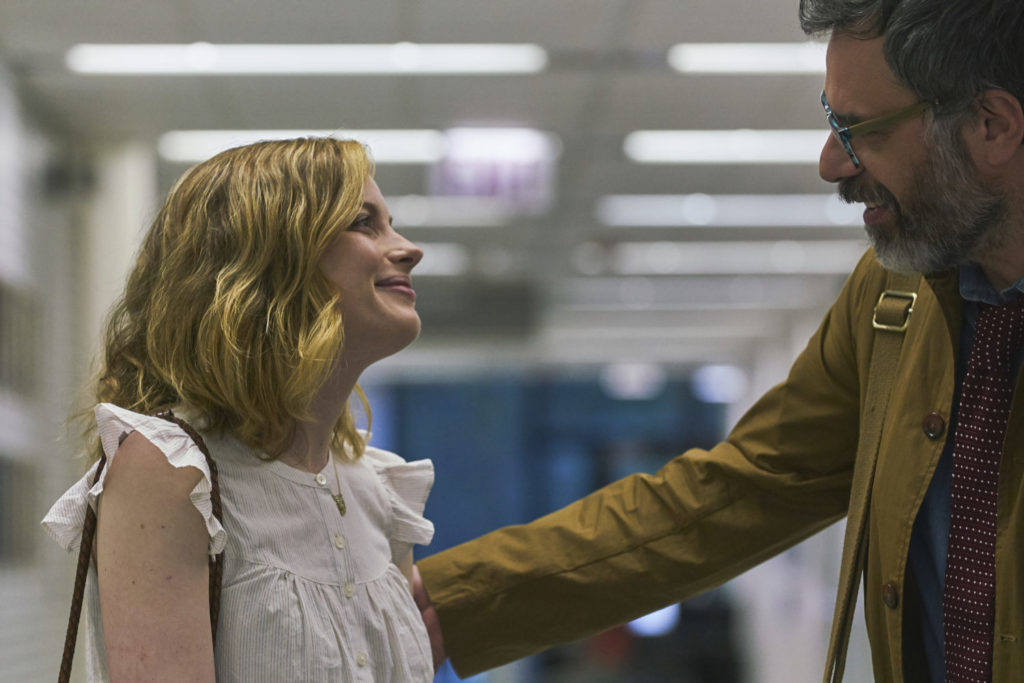
I USED TO GO HERE (Gravitas Ventures)
I Used To Go Here (VOD)
Its publication day for Kate (Gillian Jacobs) and things are not going well. Sales for her first novel are disappointing and her publisher has cancelled the publicity tour. When her college professor (Jermaine Clement) invites her to do a reading, Kate jumps at the chance, prompting a long weekend of foolishness, regret, and chances are, a harsh lesson or two.Like many (most) writers, Kate has maturity issues, and soon falls in with the kids living in her old college dorm, whose love woes become a bit too enticing for Kate. An amiable comedy that never quite soars, I Used to Go Here, from writer-director Kris Rey, is admirably honest about its heroine’s failings, with the naturally winning Jacobs never angling for easy sympathy. Kate’s moment of self truth, brief and private, is hard earned and just right.
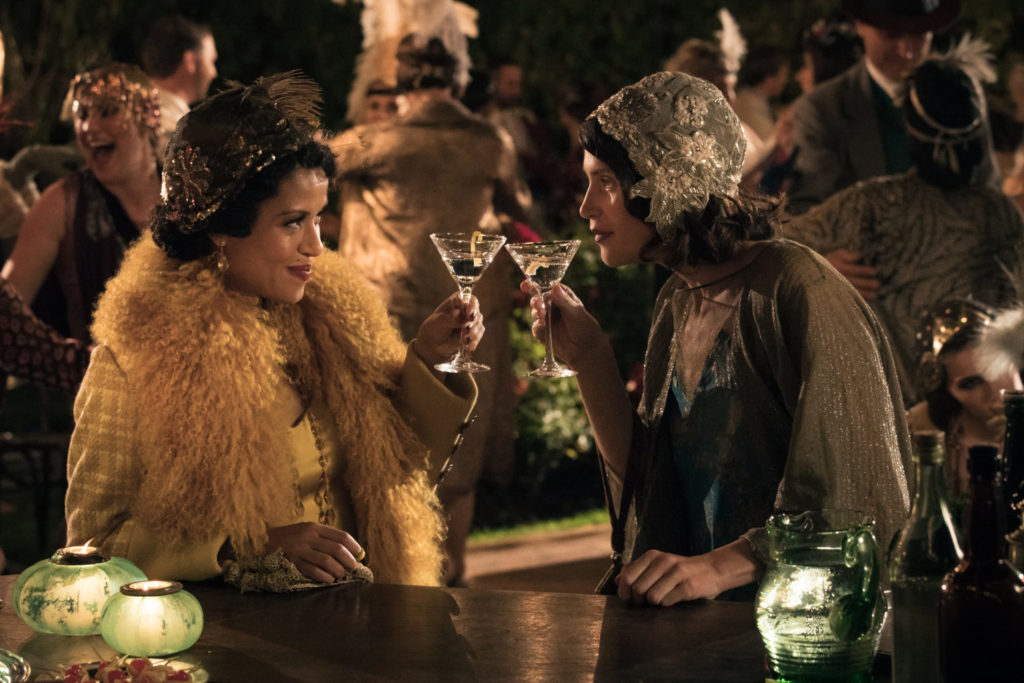
SUMMERLAND (Michael Wharley for IFC)
Summerland (VOD)
The period drama Summerland is dull and compelling, all at once. Resistance may be futile.The gifted Gemma Aterton stars as Alice, a cranky, self-absorbed writer living alone in an English village during World War II. When the local authorities bring her a young evacuee named Frank (Lucas Bond) to care for, Alice is not thrilled, but over time, as these things tend to go, the two come together over a shared love for a mystical land known as Summerland. The boy’s presence prompts Alice to remember her one moment of happiness, a love affair with a Black woman named Vera (Gugu Mbatha-Raw) in the 1920s. Presented in a series of awkwardly placed flashbacks, the affair is sensual and lovely, but underwritten since we learn little of Vera’s life or viewpoint. Beautifully photographed by Laurie Rose, Summerland is slow going until tragedy strikes for Frank, prompting a series of events that wrap up with a maddening tidiness, which isn’t to say they aren’t compelling. Maybe it’s best to file this under Guilty Pleasures.
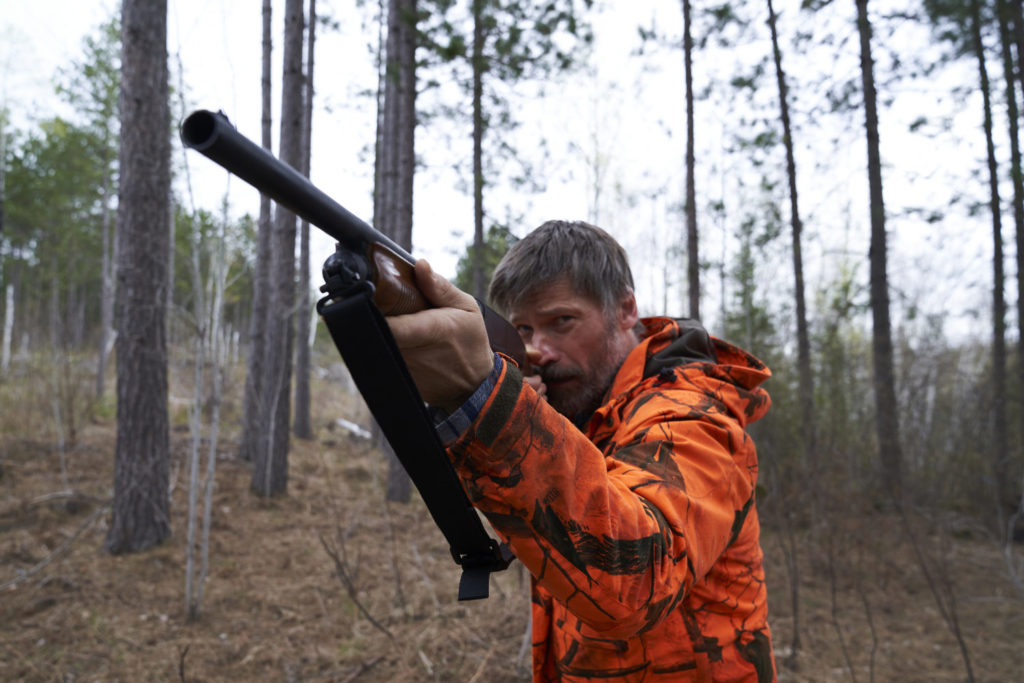
THE SILENCING (Saban Films)
The Silencing (VOD)
The dog is the best detective in this underwritten but diverting mystery thriller set deep in the Minnesota woods. Reyburn (Nikolaj Coster-Walda), a renowned hunter, now runs an animal sanctuary in honor of his long-missing daughter.One night, Reyburn’s dog begins barking at the sanctuary video monitors — a young woman is running desperately through the woods. A man clad head to toe in animal fur and carrying a bow and arrow is hunting her. Reyburn dashes to the rescue, leading to a long night of narrow escapes and more than one well-staged fight sequence.Belgian director Robin Pront has a gift for action, especially at night, and screenwriter Micah Ranum drops some nice plot turns into that action, but the revelation of the man beneath the fur proves to be a letdown. The dog probably could have written a better ending.
Advertising disclosure: We may receive compensation for some of the links in our stories. Thank you for supporting Irvine Weekly and our advertisers.

